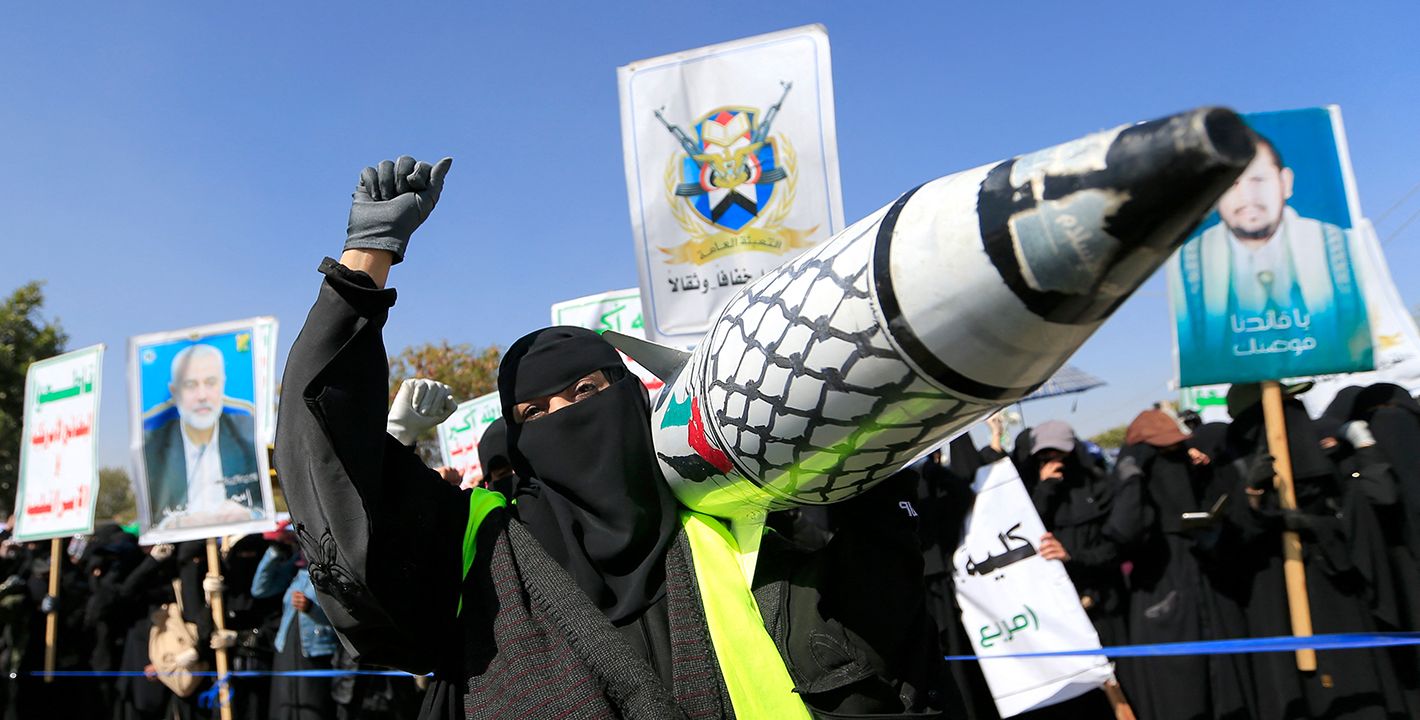In an interview, Ibrahim Jalal discusses the Southern Transitional Council’s recent takeover of Hadhramawt and Mahra.
Michael Young
{
"authors": [
"Doaa Mohammed"
],
"type": "commentary",
"blog": "Diwan",
"centerAffiliationAll": "",
"centers": [
"Carnegie Endowment for International Peace",
"Malcolm H. Kerr Carnegie Middle East Center"
],
"englishNewsletterAll": "",
"nonEnglishNewsletterAll": "",
"primaryCenter": "Malcolm H. Kerr Carnegie Middle East Center",
"programAffiliation": "",
"programs": [],
"projects": [],
"regions": [
"Yemen"
],
"topics": []
}
Source: Getty
The Zainabiyyat battalion has been able to access traditionally inaccessible spaces in Yemen.
One of the lesser-known stories from the Yemen conflict is that Ansar Allah, better known as the Houthis, has an all-female military battalion called the Zainabiyyat. The battalion consists of women and young girls from the more vulnerable social classes and Muhamasheen (Yemenis with allegedly African origins who face discrimination), who have been trained according to Iranian Islamic Revolutionary Guard Corps protocols.
The Zainabiyyat was established in Saada Governorate over a decade ago, and was active during the six conflicts between Ansar Allah and the state. However, it became more prominent after Ansar Allah’s takeover of Yemen in September 2014. Its role has principally involved gathering intelligence and engaging in logistical support for Ansar Allah, as well as spreading the group’s ideology. It has been reported that the Zainabiyyat battalion was trained in Yemen’s capital Sanaa, Lebanon, and Iran. Allegedly, its establishment was inspired by the experience of the Basij paramilitary force in Iran, but comparisons have also been made with the Hisba force of the so-called Islamic State group and Iran’s Faraja female security unit.
Among the things the Zainabiyyat do is taking part in female gatherings, recruiting women and children, and collecting information about those who oppose Ansar Allah. In 2017, the battalion made its first public appearance at a military parade in Sanaa. Information about its structure and number of recruits is not consistent or clear, but it was estimated at over 4,000 women in 2022. What is publicly known is that the Zainabiyyat is made up of four units supervised by the wives and sisters of Ansar Allah’s leaders: a military unit; an electronics group, which also deals with social media; a detention unit; and a preventive espionage unit that spies on Yemeni society.
The most dangerous unit when it comes to freedoms in Yemen is, arguably, the preventive espionage unit, which penetrates informal gatherings of females to gather information. In Yemeni culture, males, even those in the military, have limited access to female spaces. Hence, the Zainabiyyat can fill this gap without retaliation from the society’s tribes or elites. Moreover, the deployment of the unit gives Ansar Allah full access and influence over all parts of society, making the Zainabiyyat a powerful, yet also often invisible, tool of its systems of governance and repression.
The battalion’s activities include raiding female mosques to force those present to listen to lectures praising Ansar Allah and consolidating the idea that, because its members are regarded as descendants of the Prophet Mohammed, their authority and leadership are legitimate. The Zainabiyyat security apparatus has reportedly conducted arrests and attacks against female activists opposing Ansar Allah, broken up female protests, and even performed more sordid tasks. There have been reports that the Zainabiyyat have been involved in the torture of detained women to force them to make recorded confessions.
For example, several years ago a released activist named Aisha recounted her abduction and imprisonment in a secret prison in Sanaa. She was physically abused on a daily basis, to the extent that she lost consciousness several times. She also reported being subjected to sexual harassment and threats of rape if she did not accept false accusations that she had collaborated with the Saudi-led coalition. She resisted for two months, then finally agreed to making a filmed confession in exchange for her release. Yet after she recorded the video, she remained imprisoned for an additional year and two months.
One of the Zainabiyyat’s more notorious actions was detaining females who protested in favor of burying the body of Ali Abdullah Saleh in 2017 after his assassination. Ansar Allah eventually buried Saleh in an unknown location, in the presence of only a few members of his family. The protesters were confident that the males would not attack them, because attacking women in this way is unacceptable according to Yemeni norms, but they were surprised by the violent reaction of armed gunmen and the Zainabiyyat members. A few days later, they conducted house searches looking for military men loyal to Saleh or his political party. After October 7, 2023, they were involved in pressuring women to attend mobilization ceremonies in Sanaa, Ibb, and Hajjah, for the purpose of supporting Gaza and building Ansar Allah’s military capacity to stand in solidarity with Palestine and Lebanon.
In recent years, the Zainabiyyat have also been involved in making sudden visits to homes to “encourage” women to donate money and jewelry to finance the war effort, and such behavior is continuing. There is testimony from housewives who have claimed that if they refused to make a contribution, they would lose their access to cooking gas. According to Ansar Allah sources, in December 2024 the Zainabiyyat managed to collect around $100,000 through such methods for the development of the group’s rocket force.
Earlier, in 2020, Ansar Allah was involved in raiding graduation ceremonies to combat mixed-gender gatherings and banning music. Furthermore, the Zainabiyyat participated in entrapping politicians who express disagreement with Ansar Allah’s leadership by participating in inappropriate calls and chats with them, then blackmailing them. The Yemeni Network for Rights and Freedoms report has reported 1,444 violations against Yemeni women committed by the Zainabiyyat between December 2017 and October 2022.
The importance of the Zainabiyyat is that it shows how Ansar Allah is expanding and institutionalizing its instruments of repression in the areas it controls. In 2020, the battalion was granted official military rankings, and members have been deployed to the battlefront in exchange for financial incentives. The Zainabiyyat are particularly concerning because, as females, they have the capacity to blend into the deepest fabric of Yemeni society. This concern was raised before the United Nations Security Council in 2020. In February 2021, the UN sanctioned the late director general of the Criminal Investigation Division, Sultan Zaben, for using the Zainabiyyat in surveillance operations and torturing and abusing detained women.
The institutionalization of the Zainabiyyat reflects the extent to which Ansar Allah weaponized gender roles to access otherwise traditionally inaccessible spaces. Through this battalion, they have created a powerful mechanism of surveillance, indoctrination, and oppression. An expansion of the battalion’s size and capabilities could lead to the complete erosion of civil liberties in those areas where Ansar Allah’s control persists.
Doaa Mohammed
Carnegie does not take institutional positions on public policy issues; the views represented herein are those of the author(s) and do not necessarily reflect the views of Carnegie, its staff, or its trustees.
In an interview, Ibrahim Jalal discusses the Southern Transitional Council’s recent takeover of Hadhramawt and Mahra.

Michael Young
The potential for rising tension in the Yemeni governorate worries those on both sides its borders.

Ibrahim Jalal
Through a campaign of arrests, the Houthis are moving forward in introducing a program of “radical change” in the country.

Ibrahim Jalal
As Tehran moves toward consolidating its regional power, will it agree to ultimately disarm its Arab allies? Can it afford not to?

Michael Young
Saudi-Iranian reconciliation has meant that Tehran and Riyadh are reasserting their interests more strongly in Lebanon.

Michael Young